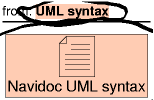UML syntax
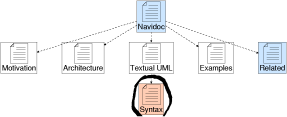
Defining UML diagram begins like any directive definition in reStructuredText:
.. UML:: foobar
After the definition follows an indented content. The content should contain definition part and usually also layout part.
Definition
There are several possibilities for definition of UML elements. The first variant is the most clearest, but the others allow explict definition of variables for elements. After the first definition the element is referred using its name, after the later definitions the element is referred using its variable.

Syntax:
class foo

Syntax:
foo = class foo123

Syntax:
class (foo) foo123
Because of MetaPost elements' variable names cannot contain any numbers. Therefore, when e.g. a class name contains numbers one of the two later variants must be used to define legal variable for element.
Layout
Layout part is distinguished from definition part using a line with three or more -. The layout part is actually just MetaPost, but some helpful macros and attributes are provided to help placing elements. Also pure MetaPost is allowed.
horizontally

Syntax:
class foo class bar --- horizontally(50, horiz, foo, bar);
The first parameter ("50") the for space between objects. The second parameter("horiz") is variable name for the layout's coordinate system.
vertically

Syntax:
class foo class bar --- vertically(50, vert, foo, bar);
Mixed use

Syntax:
class foo class bar class foobar --- horizontally(50, horiz, foo, bar); vertically(50, vert, horiz, foobar);
Elements
class
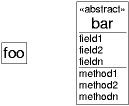
Syntax:
class foo
class bar "abstract"
fields
field1
field2
fieldn
methods
method1
method2
methodn
---
horizontally(50, hor_c, foo, bar);
Note: a class' name may contain a stereotype like "abstract" within quotation marks.
component

Syntax:
component foo
interface

Syntax:
component foo
assoc foobarA
assoc foobarB
foobarA = interface bar1
foobarB = interface bar2
---
horizontally(50, horiz, foobarA, foobarB);
vertically(20, vert, horiz, foo);
package

Syntax:
package foobar
bigpackage

Syntax:
bigpackage foobar
class foo
class bar
---
horizontally(50, horiz, foo, bar);
Note: The first syntax of bigpackage seem to have currently a few unfortunate restrictions:
- bigpackage itself cannot be linked
- bigpackages cannot be placed using horizontally or vertically macro
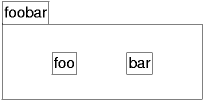
Syntax:
bigpackage foobar class foo class bar --- foo.sw = (50,25); horizontally(50, horiz, foo, bar); foobar.sw = (0, 0); foobar.ne = (200,75);
Connections
inherit

Syntax:
class foo
inherit bar
class bar
---
horizontally(50, hor_c, foo, bar);
realize

Syntax:
class foo
abstract bar
class bar "abstract"
---
horizontally(50, hor_c, foo, bar);
dep

Syntax:
class foo
dep "create" bar
class bar
---
horizontally(100, hor_c, foo, bar);
Note: stereotype within quotation marks is obligatory.
use

Syntax:
class foo
use bar
class bar
---
horizontally(50, hor_c, foo, bar);
assoc
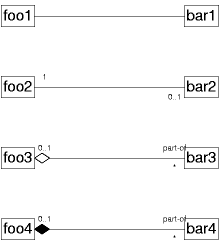
Syntax:
class (fooA) foo1
assoc barA
class (fooB) foo2
assoc multi(1) - multi(0..1) barB
class (fooC) foo3
assoc aggreg multi(0..1) - multi(*) role(part-of) barC
class (fooD) foo4
assoc compos multi(0..1) - multi(*) role(part-of) barD
class (barA) bar1
class (barB) bar2
class (barC) bar3
class (barD) bar4
---
horizontally(150, hor_cA, fooA, barA);
horizontally(150, hor_cB, fooB, barB);
horizontally(150, hor_cC, fooC, barC);
horizontally(150, hor_cD, fooD, barD);
vertically(50, ver_c, fooA, fooB, fooC, fooD);
naryassoc

Syntax:
naryassoc nary
class (fooA) foo1
assoc multi(1) - nary
class (barA) bar1
assoc multi(*) - nary
class (barB) bar2
assoc multi(*) - nary
---
horizontally(150, hor_c, fooA, nary, barA);
vertically(50, ver_c, barA, barB);
qual

Syntax:
class foo
qual q
fields
foobar
assoc multi(*) - multi(0..1) bar
class bar
---
horizontally(150, hor_c, foo, bar);
q.w = foo.e;
Note: unfortunately, qualifier must be attached manually (see the line q.w = foo.e;).
supply

Syntax:
class foo
supply bar
class bar
---
horizontally(50, hor_c, foo, bar);
seqobject

Syntax:
seqobject foo seqobject bar --- horizontally(50, hor_c, foo, bar);
sequence
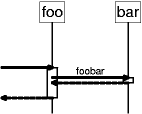
Syntax:
seqobject foo
seqobject bar
sequence foobar
call foo
call bar "foobar"
return
return
---
horizontally(50, hor_c, foo, bar);
Linking
from module
Syntax:
page bar
link foobar
bar.html
Note: available modules must be specified in config.
from javadoc
Syntax a)
class org.foobar.foo
jlink
Syntax b)
class foo
jlink
org.foobar.foo
Syntax c)
jlinkpackage org.foobar
class foo
jlink
Note: available javadocs must be specified in config.
from doc++
Syntax a)
class foobar::foo
clink
Syntax b)
class foo
clink
foobar
Syntax c)
jlinkpackage foobar
class foo
clink
Note: available doc++ documentations must be specified in config.
